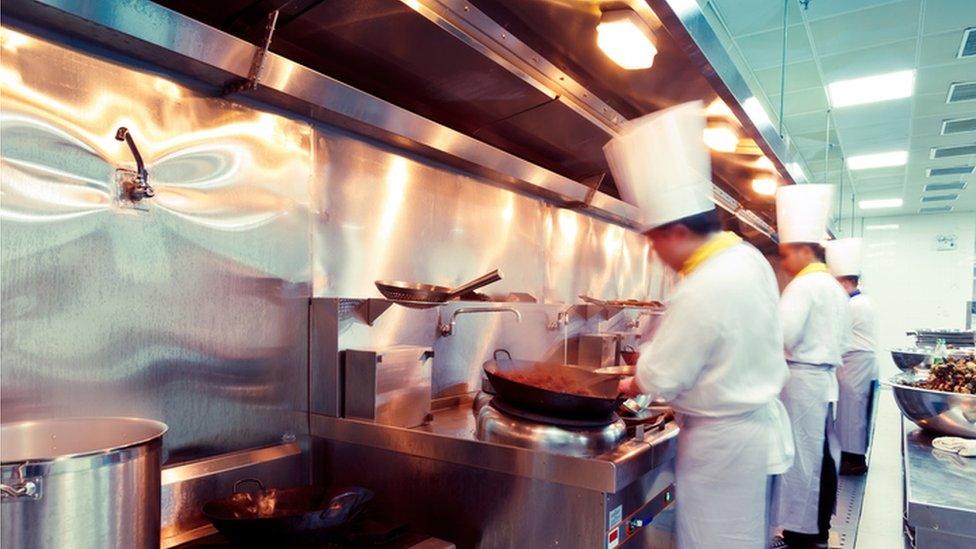Scotland the Becalmed
- Published

This time, it's the housing market. Not that prices are falling - plenty people would welcome that, home owners perhaps less so. The problem is that activity is slowing up.
We've had three years in which insufficient numbers of homes have come on to the market, and too few are being built to meet projected growth in demand.
The latest from the surveyors at Rics is that insufficient numbers are entering the market as buyers. The best that can be said is that prices have sort of stabilised.
That report is the latest in a long run of flashing lights in the Scottish economic cockpit. We sometimes complain there is not enough statistical data to know what's going on out there.
But when almost all of the numbers are telling a similar story, and it's not a good one, then perhaps it's time to pay more attention.
Chef executive
Immediately before Rics, it was the recruitment agency survey from Markit data specialists (the monthly one formerly sponsored by Bank of Scotland).
There's growth in the number of job starts, but very little. More significant is that, despite redundancies from the offshore sector, skill shortages are becoming clearer, so starting pay is rising.
The problem looks most severe in hotels and catering. A chat with the proprietor of my favourite curry shop this week brought news that the market for chefs is tightening again, due to visa restrictions.

Why not train up people you recruit locally? They are unrealistic about the pay they can expect, I was told. If that sounds like exploitation of an inbound Indian, then it's the price paid to keep your lamb pasanda below £10.
He may have to cut out his curry carry out service due to that lack of capacity. Forget all the economic academic abstractions - that is a real life example of the economy contracting.
Rank outsider
Before that, it was the turn of the Royal Bank of Scotland's regional tracker. It takes us back to the last quarter of last year, to show that there was 0.7% growth in Scotland's higher quality jobs.
Their growth outweighed the loss of low-skilled jobs, which were down 2% in the year.
But Scotland's job performance last year was the worst of any nation or region. And it's not all because of London and the south-east surging ahead in its property bubble.
Only two regions - East Midlands and Yorkshire with Humberside - shared with Scotland in falling lower-skill jobs.
In creating high-skill jobs, Scotland was also ranked poorly, with 1.7% growth.
Yorkshire with Humberside had growth of 6.2% in that vital element for sustained growth. North-west England was up 5.6% on higher skill roles.
'Deep rooted causes'
Also at the start of the week, we were told that business optimism has fallen below the long-term trend for growth. That's according to a report from the Centre for Economic and Business Research, commissioned by BDO business consultancy.
It draws on the big UK surveys carried out by others, though without many reliable specifics about Scotland. Business optimism and output fell, it found, due to a lack of direction in the economy.
According to Martin Gill, head of BDO in Scotland: "The reduction in output and optimism cannot just be put down to uncertainty due to the EU referendum and may have some more deep rooted causes."
He doesn't say which causes, preferring to talk symptoms: "We need to see greater investment and higher productivity to improve capacity, encourage growth and ultimately drive up living standards.
"If businesses don't foresee growth and a more optimistic outlook in the next few months, then we could be in for a bumpy ride this autumn."
'Stagnation'
From the Bank of Scotland came a report on oil and gas, showing that a third of firms intended (at the start of this year) to keep cutting jobs through 2016. More than half of Scottish firms in the sector reported a severe or quite bad impact from the oil price downturn.
And for all the hopes that business leaders will turn their attention to exports, this sector - with notable successes in exports over recent years - appeared to be pulling back on its interest in expansion overseas.

Experts say the North Sea oil gloom is continuing
Scottish Engineering, representing the sector, last week put out its regular membership survey. The headline offered reassurance that things were "holding steady".
On closer inspection, what it meant was that the signs of decline were steadily continuing.
Among smaller engineering firms, order intake was up for 28% of those responding, and down for 44%. Medium sized companies were also clearly tipped to the negative. And output volumes were showing similar margins.
Said chief executive Bryan Buchan: "Our sector is suffering from stagnation... We appear to be marking time in terms of capital investment".
He blames the oil and gas downturn, of course, along with a global slowdown and uncertainty from that EU referendum.
'Malaise'
At the start of this week, there was the Scottish Item Club of economists, hosted by business consultancy EY. (Item is the Independent Treasury Economic Model - that is, a reputable model of the economy developed at the Treasury, with numbers independently applied by economists.)
It's in the forecasting business, which can be dismissed as a mug's game. It's almost always wrong. But what it can show us is a direction of travel.
So after cutting its forecast for 2016 Scottish output growth last November to 1.9%, it has looked again at the evidence and concluded that Gross Domestic Product (GDP) growth over this calendar year now looks like 1.2%.

The Scottish Item Club suggested that consumer spending was holding the economy together
The oil gloom continues, and construction is running out of steam. "GDP is becalmed," it headlines.
In the second half of last year, it rose only 0.1%, and it was only positive because construction has been performing a lot better than manufacturing and services.
"The fallout from the oil bust appears to be percolating across the Scottish economy," it says. "As a result of the overall malaise, the buoyancy of the labour market has faded, while survey results point to sluggish growth at best."
The most positive news the Scottish Item Club can offer is that consumer spending is holding things together, as government retreats, business investment stalls and exports struggle.
Consumers are helped by low interest rates and a modest rise in real earnings. But a lot of their spending is on top of very high household debt. Some think it unsustainably high.
Job creation
That's while the British economy is on track to reach 2.3% growth. A smaller but still significant gap is expected to continue into 2017 (with Scottish growth up to 2%) and again the year after.
And that gap is most glaring in the unemployment figures. As I've noted before, Scotland's unemployment rate has stuck above 6%, clearly above the UK as a whole.
Job creation has been poor in Scotland, while the southern neighbours have been churning out new jobs at a rate that's been startling economists.
If it weren't for a large number of Scots leaving the workforce last year, for unclear reasons, the unemployment figures could now be heading sharply upwards. We'll get another update next week from the Office for National Statistics.
Inward investment
It's not been relentlessly grim. The annual EY report on inward investment and the attractiveness of the UK's nations and regions recently showed Scotland performing very well, relative to most others.
That is as the market for attracting Foreign Direct Investment has changed, and projects are typically smaller.
While heaping praise on Scotland for attracting software projects and business services, the EY report came with warnings not to rest on its laurels; manufacturing projects are not coming to Scotland, and the "Northern Powerhouse" policy from Whitehall, to boost the north of England, is making it a tougher competitor.
While Scotland is good at attracting investment from the well-travelled trade routes across the Atlantic, it is not so good at getting existing foreign investors to expand, and it needs to do more to attract Chinese and Indian investors.

Finally, there is the hotel trade. The latest from BDO's survey of activity is a reminder that, for all the new capacity added in Aberdeen in recent years, occupancy and rates have tanked. The rest of the country has been doing very well, however, and it has been sustained for around five years.
As we can see around us at the BBC office in Glasgow, the hopes of building a "digital quarter" have been re-directed towards hospitality (though we're still a long way from a decent pub).
Resilience
To all this last week, the Scottish Parliament noted that the economy remains "resilient". Technically, that's true. It's not in recession, but it's a close run thing.
And if all this survey material is the equivalent of kicking the economy's tyres, its resilience doesn't feel, well, very resilient.
Someone else who has been watching the negative data pile up has been Jeremy Peat, visiting professor at Strathclyde University and former chief economist in RBS's heyday.
He wrote in The Herald this week, external that this needs urgent attention and a lot of focus from the Scottish government. He urged those in St Andrew's House not to expend their energy on the minutiae of tax planning and block grant calculation at the expense of figuring out how to get the economy growing.
He proposed that the new finance role, with Derek Mackay as cabinet secretary, needs to vet spending plans for their impact on growth as much as their contribution to re-distribution and equality.
He wants parliament to beef up its role in scrutinising and supporting economic growth, and particularly the committees.
And Prof Peat wants to see outside bodies getting involved - not just stronger university input to policy, but from the business and trade bodies.
Of course, outsiders can pile in with their expertise. They can call for serious analysis, and evidence-based policy.
The test is of those in a position to do something about all this. Is anyone listening? Will they act? Who is minding the growth gap?